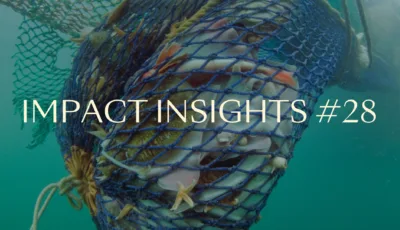Impact Insights #16
Discover the latest impact insights curated by Norselab's Impact Analyst, Christiaan Griffejoen.
■ No more fossil fuel licenses needed a new study reveals
In a bombshell report from UCL, experts declare there's absolutely no need for new oil, gas, or coal licenses! The latest study reveals that current fossil fuel production is more than enough to meet global energy demands while staying true to international climate targets.
The study sends a clear message: expanding fossil fuel extraction flies in the face of the Paris Agreement and our desperate need to tackle climate change. The findings highlight the dangerous disconnect between ongoing fossil fuel projects and the urgent climate actions needed to avert disaster. Researchers argue that focusing on renewable energy sources and ramping up energy efficiency is the real path to a sustainable future. The study calls out governments and industries for pushing new fossil fuel projects despite the clear scientific consensus on climate change. It’s a wake-up call for policymakers to stop kowtowing to the fossil fuel lobby and start making serious moves toward a green energy revolution.
Even more startling, the study warns that current fossil fuel infrastructure alone could push us past the critical thresholds set by climate agreements. The researchers urge an immediate halt to new fossil fuel projects and a rapid phase-out of existing ones to keep global temperatures in check.The message is clear: Get ready for a green revolution because the era of fossil fuels is over. The only way forward is a full-throttle transition to renewables, and this study proves it. The message is loud and clear: the future is green, or there’s no future at all.
(This was first covered by The Guardian.)
■ The $9 trillion green revolution: Who's paying up?
Brace yourselves! The global shift to green energy is set to cost a staggering US $9 trillion (Financial Times). As nations rush to ditch fossil fuels, the big question looms: who's picking up the tab? Governments are eyeing a range of taxes to fund this massive transition. The U.S. plans to collect $300 billion over the next decade through a corporate minimum tax and a tax on stock buybacks, thanks to the Inflation Reduction Act (IRA).
This financial scramble is urgent. Last year, nearly 200 countries committed to phasing out fossil fuels by 2050 and boosting renewable energy by 2030. The upcoming COP29 in Azerbaijan dubbed the “Finance COP,” will focus on setting a global climate finance target to help poorer nations adapt, but rich countries are also grappling with the green transition's costs. In wealthy nations, politicians hope the private sector will cover most of the expenses, but public funds are still crucial. The International Energy Agency (IEA) estimates that public funding will need to cover about 30% of the total climate finance, with the rest coming from private investments.
However, there's political risk. As living costs rise, additional financial burdens could trigger public backlash. Ireland is hiking carbon taxes, using the revenue to fund energy-efficient home upgrades, but this comes with higher fuel costs, stirring discontent. In the UK, the Labour Party proposes a windfall tax on oil and gas giants to fund its Green Prosperity scheme. Globally, a proposed "extraction tax" on the richest fossil fuel companies could raise $720 billion by 2030. Wherever the money will come from, one thing is certain: Capital must be mobilized now to avoid the far costlier alternative: repairing the damages of inaction.
■ Shell has sold millions of ‘phantom’ carbon credits based on emissions savings that never happened
Oil sands execs have successfully tricked the federal and Alberta governments to foot the bill for their “carbon capture projects” while actually funding oil extraction. Shell's Quest project, the first and only carbon capture and storage (CCS) initiative in the oil sands, highlights how CCS can be a smokescreen to delay energy transition while taxpayers pick up the tab (Greenpeace). As a part of their Quest project, that was was supposed to be a pilot leading to 30 megatonnes (MT) of CCS annually by 2020 and 139 MT by 2050, Shell has sold over $200 million in phantom carbon credits through a deal with the Alberta government, earning two tonnes of emissions credits for each tonne of carbon stored. However, in reality, Quest negated less than one MT of emissions in 2022, while oil sands emissions soared by 50 MT since Quest’s inception and by 16 MT since 2016 Proving that this credits scheme provides no real environmental benefit but instead lets Shell dodge full carbon compliance costs while extracting more oil. Documents reveal that in 2009, Shell negotiated multiple credits to increase subsidies for their project. Once these phantom credits are factored in, the public has funded 93% of Shell’s Quest project, with the venture pocketing a $126 million profit by the end of 2022. The Quest facility captures under a third of emissions from its oil sands upgrading site and less than 1% of upstream emissions.
Now, the Pathways Alliance, a group of oil sands companies, proposes capturing 10-12 MT yearly, a mere 15% of upstream emissions. Despite raking in record profits, they want the government to cover most costs. The International Energy Agency warns that CCS reliance isn't viable, and oil companies must reduce extraction to align with the Paris Agreement. Without genuine action, CCS is just a phantom fix.
■ 70% of companies have abandoned acquisitions due to ESG concerns
Social & Environmental considerations are increasingly critical in mergers and acquisitions (M&A). Deloitte's 2024 ESG in M&A trends survey reveals that improved data and measurement tools have enhanced understanding of ESG's impact on deal valuations, targeting, and portfolio management. Leading to ESG becoming a central component of M&A strategy. The survey highlights three key trends: better integration of ESG factors, the need for defined ESG approaches in post-merger integration, and the role of M&A in achieving ESG goals. Organizations are increasingly confident in their ability to evaluate ESG profiles, reflecting a significant shift from 2022. ESG considerations are particularly strong in financial services and private equity, with many companies developing strategies to enhance their positive impact on society. As societal value creation moves to the center of what it means to do business, Impact might become a standard unremarkable consideration in M&A valuations.
■ Energy transition threatens to leave the shipping industry high and dry
A new study has revealed that the global energy transition could turn a significant portion of the shipping industry into "ghost ships," potentially wiping out up to $286 billion in value from fossil fuel carriers (Financial Times). Researchers from University College London and Switzerland’s Kühne Foundation warn that over a third of the world’s commercial shipping fleet, which currently transports fossil fuels, faces an existential threat. More than 13,000 oil tankers, 3,000 gas tankers, and 2,500 coal carriers could be left high and dry as the world shifts towards cleaner energy sources. If global warming is limited to 1.5C above preindustrial levels—a target set by the 2015 Paris Agreement—the demand for fossil fuels will plummet, and so will the need for these ships.
Despite a recent surge in demand driven by geopolitical upheavals like Russia's invasion of Ukraine, the long-term outlook for fossil fuel shipping is bleak. Norway’s Frontline, one of the biggest oil tanker operators, and other tanker companies have seen their shares skyrocket, but the bubble may burst as the energy transition gains momentum. The study suggests that companies should diversify and invest in cleaner energy technologies to avoid potential financial ruin. Some have already begun this shift. Belgium-based Euronav sold a chunk of its oil tankers and acquired a clean hydrogen technology firm, CMB.Tech. Additionally, financiers are becoming wary, with banks like Swedbank halting loans for new oil tankers due to sustainability concerns.
The message is clear: the shipping industry must adapt or risk becoming obsolete. As the world sails towards a greener future, the fossil fuel fleet might soon be a relic of the past, floating aimlessly in a sea of change.


